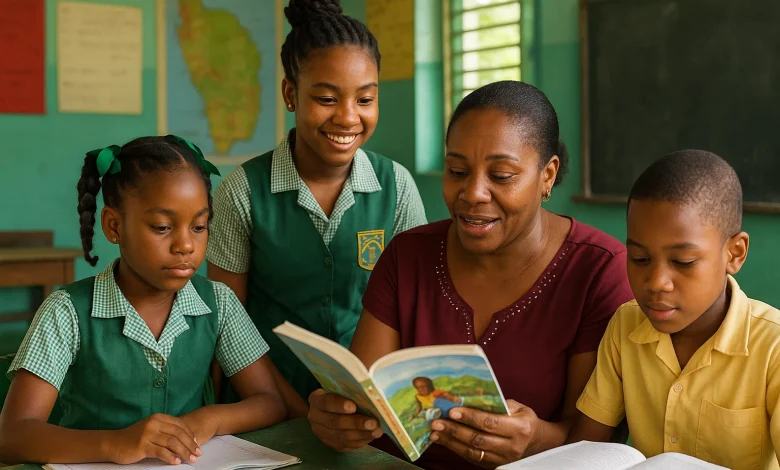Literacy in Dominica

Literacy in Dominica reflects a long-standing national commitment to education, social mobility and community advancement. The country maintains an adult literacy rate of approximately 94%, placing it among the stronger performers in the Eastern Caribbean. This high rate is tied to the structure of Dominica’s education system, where schooling is compulsory from ages 6 to 15 and supported by government investment, community partnerships and regional frameworks such as the Caribbean Examinations Council (CXC).
The literacy landscape continues to evolve as Dominica modernises its curriculum, expands digital access and adapts learning in rural villages, including the Kalinago Territory, southern interior villages and coastal communities across the west coast. The introduction of new teaching resources, improvements in teacher training, and targeted youth development programmes have created a more consistent pathway from early childhood education to secondary and tertiary levels.
Educational Foundations and Community Access
Dominica’s approach to literacy is shaped by inclusive policies that ensure access regardless of geography. Primary schools and secondary schools operate across all parishes, with government efforts focused on closing gaps between remote areas, such as Concord, Petite Soufrière, and parts of St. Joseph, and urban centres like Roseau and Portsmouth. Adult education programmes, evening classes, and second-chance learning initiatives help address the needs of learners who did not complete formal schooling, strengthening community development and employability.
Special attention is given to learners with special education needs through the Ministry of Education and partner organisations that support inclusive education practices. Trained specialists, resource rooms, and targeted interventions help build literacy in diverse learning populations. Programmes for early-grade reading, phonics development and numeracy support are also crucial for reducing disparities that may emerge in the first years of schooling.
The expansion of digital infrastructure has further enabled literacy development. Devices, computer labs and broadband improvements support blended learning and exposure to digital tools. Schools participating in regional projects access resources through digital platforms that improve lesson planning and provide interactive materials, helping teachers enhance reading and writing competency in the classroom.
Broader Types of Literacy in Dominica
Dominica’s literacy landscape extends far beyond reading and writing. Multiple literacies influence how citizens engage socially, economically and politically.
Key forms of literacy relevant to Dominica include:
- Digital literacy: Understanding online platforms, using devices, navigating e-government services and engaging safely in digital spaces.
- Financial literacy: Managing savings, budgeting, understanding credit, insurance and MSME financing, especially important for small business development.
- Health literacy: Interpreting medical instructions, recognising public-health risks and navigating clinics, essential in a climate-vulnerable island.
- Environmental literacy: Understanding ecosystems, conservation, climate resilience and sustainable resource use across land and marine environments.
- Civic literacy: Knowledge of public institutions, electoral participation, community leadership and the functioning of Dominica’s democracy.
- Cultural literacy: Awareness of Creole heritage, Kalinago traditions, local music, festivals and historical narratives.
- Media literacy: Evaluating information, identifying misinformation and navigating political or commercial messaging.
- Numeracy literacy: Applying mathematical skills across education, commerce and digital tools.
National Development and Future Outlook
Literacy remains closely linked to Dominica’s sustainable development goals, particularly as the country strengthens disaster resilience, expands tourism, grows its digital economy and builds human capital. A population with strong literacy skills can participate in civic processes, adapt to technological change and contribute to sectors that require analytical and communication competencies.
The integration of digital learning, early-reading interventions, community partnerships and inclusive education strategies will play a major role in sustaining Dominica’s progress. Continued investment in rural access, teacher development and technology infrastructure will help reduce gaps and ensure equitable opportunities for all students.
As Dominica advances its vision for national resilience and educational transformation, literacy remains a foundation for empowerment, participation and long-term social wellbeing.




